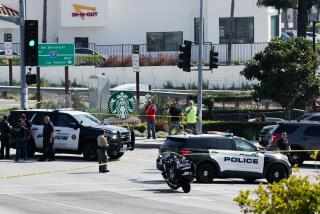Cited for Contempt : Times Reporter Held in Jail for 6 Hours
A Los Angeles Times reporter was cited for contempt and jailed for several hours Wednesday after she refused to answer a question in Long Beach Municipal Court concerning an arrest she witnessed while preparing a story on a police task force.
Roxana Kopetman, a reporter in The Times’ Long Beach bureau, spent about six hours in a courthouse lockup before she was released on a writ of habeas corpus. Los Angeles Superior Court Judge Aurelio Munoz, who issued the writ, set the matter for a hearing today.
Earlier in the day, Municipal Judge Elvira S. Austin imposed a $100-a-day fine and an indefinite jail sentence on Kopetman until she responds to a prosecutor’s question regarding whether she heard a police officer ask a man for permission to search his clothing.
The man, Sean Delaney, 21, is on trial before Austin on a misdemeanor charge of carrying concealed brass knuckles in his jacket. He was confronted by officers as he sat with his girlfriend at a shopping mall.
Judge Austin said she also planned to jail and fine Times intern photographer Roberto Santiago Bertero, who photographed the arrest, unless he testifies today about whether officers sought permission for the search. Bertero, 40, joined Kopetman in refusing to answer the question in court Wednesday.
Kopetman, 27, cited the state reporter shield law in refusing to answer questions that went beyond the scope of her published story on a downtown Long Beach police task force.
“By doing the public defender’s job or doing the prosecutor’s job, my credibility would be seriously eroded if I went from being a reporter to being a witness,” Kopetman said before being led to a courthouse lockup by a bailiff.
Attorneys for The Times, who appeared in Austin’s court, contended that the shield law protects reporters from being cited for contempt for refusing to disclose unpublished information or the identity of confidential sources. The newspapers’ attorneys also argued that reporters have a qualified privilege under the First Amendment protecting them from being compelled to testify in criminal cases.
But Austin said that Delaney’s Fourth Amendment protections against unreasonable search and seizure outweigh the reporter’s and photographer’s First Amendment press freedom rights.
She said she does not believe the shield law is applicable in the case, but even if it did apply, “it would take a back seat to the due process of law.”
“Ms. Kopetman was a percipient witness to acts that might constitute a crime or exonerate the defendant,” Austin said.
The judge said Kopetman’s testimony was crucial because she witnessed the incident with “no ax to grind” and can be “completely independent.”
More to Read
Start your day right
Sign up for Essential California for news, features and recommendations from the L.A. Times and beyond in your inbox six days a week.
You may occasionally receive promotional content from the Los Angeles Times.






